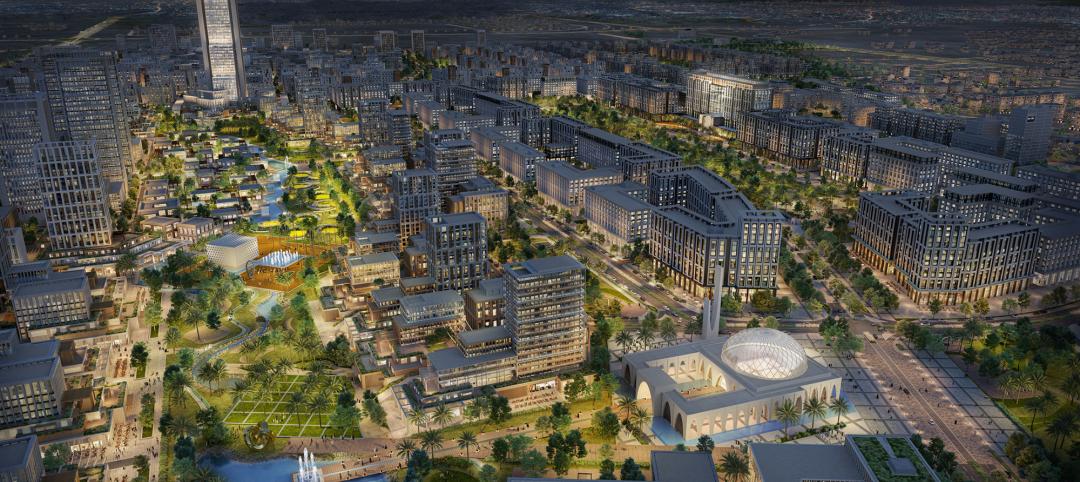Immigration policies have been front and center during this election year as candidates and citizens alike have thrown out their ideas for the best approach to the issue. And now, an architecture firm has put forth its own idea for how to solve the contentious problem surrounding country borders.
As ArchDaily reports, fr*ee, an architecture firm founded by Fernando Romero, has come up with the idea of creating a binational city on the border of the United States and Mexico. The city would be conducive to both sides of the border, use tools of enterprise such as special economic zones, and blend the cultures of each country to create something entirely new and unique.
The ‘border city’ would be situated in New Mexico, Texas, and Chihuahua, an ideal location thanks to the new inland port of Santa Teresa, the I-10 highway, the seven existing border crossings, and the population of the area totaling over 100 million people, meaning an introduction of a new city would actually be feaasible.
The masterplan for the project was unveiled at the London Design Biennale between Sept. 7 and Sept. 27. The concept has been designed so it is transferable for other binational cities around the world, but a specific city in a real world locale was needed in order to properly create the masterplan.
For more information go to fr*ee’s website or watch the video below.
Related Stories
Urban Planning | Oct 30, 2024
Bridging the gap: How early architect involvement can revolutionize a city’s capital improvement plans
Capital Improvement Plans (CIPs) typically span three to five years and outline future city projects and their costs. While they set the stage, the design and construction of these projects often extend beyond the CIP window, leading to a disconnect between the initial budget and evolving project scope. This can result in financial shortfalls, forcing cities to cut back on critical project features.
Designers | Sep 20, 2024
The growing moral responsibility of designing for shade
Elliot Glassman, AIA, NCARB, LEED AP BD+C, CPHD, Building Performance Leader, CannonDesign, makes the argument for architects to consider better shade solutions through these four strategies.
Multifamily Housing | Aug 21, 2024
Nation's leading multifamily developer expands into infrastructure
Greystar's strategy for infrastructure is driven by the shifting landscape of today's cities—primarily in the increased digitization, urbanization, and transitions to clean energy.
Urban Planning | Aug 15, 2024
New York City begins first large-scale porous pavement installation
New York City is installing its first large-scale porous pavement installation along seven miles of roadway in Brooklyn. The project will keep 35 million gallons of stormwater out of the combined sewer system each year, according to a news release.
Urban Planning | Aug 15, 2024
The magic of L.A.’s Melrose Mile
Great streets are generally not initially curated or willed into being. Rather, they emerge organically from unintentional synergies of commercial, business, cultural and economic drivers. L.A.’s Melrose Avenue is a prime example.
MFPRO+ News | Jul 22, 2024
6 multifamily WAFX 2024 Prize winners
Over 30 projects tackling global challenges such as climate change, public health, and social inequality have been named winners of the World Architecture Festival’s WAFX Awards.
Urban Planning | Jun 10, 2024
N.Y. governor halts Manhattan traffic congestion pricing plan
New York Gov. Kathy Hochul says she is indefinitely delaying the implementation of congestion pricing in Manhattan just weeks before the plan was to take effect. The controversial plan would have had drivers pay $15 to enter Manhattan south of 60th street.
Urban Planning | May 28, 2024
‘Flowing’ design emphasizes interaction at Bellevue, Wash., development
The three-tower 1,030,000-sf office and retail development designed by Graphite Design Group in collaboration with Compton Design Office for Vulcan Real Estate is attracting some of the world’s largest names in tech and hospitality.
Mixed-Use | May 22, 2024
Multifamily properties above ground-floor grocers continue to see positive rental premiums
Optimizing land usage is becoming an even bigger priority for developers. In some city centers, many large grocery stores sprawl across valuable land.
Sustainable Development | May 10, 2024
Nature as the city: Why it’s time for a new framework to guide development
NBBJ leaders Jonathan Ward and Margaret Montgomery explore five inspirational ideas they are actively integrating into projects to ensure more healthy, natural cities.

















